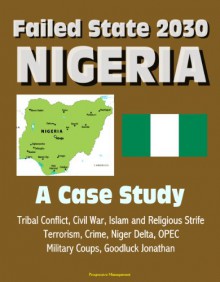Failed State 2030: Nigeria - A Case Study, Tribal Conflict, Civil War, Islam and Religious Strife, Terrorism, Crime, Niger Delta, OPEC, Military Coups, Goodluck Jonathan
This monograph describes how a failed state in 2030 may impact the United States and the global economy. It also identifies critical capabilities and technologies the US Air Force should have to respond to a failed state, especially one of vital interest to the United States and one on the cusp...
show more
This monograph describes how a failed state in 2030 may impact the United States and the global economy. It also identifies critical capabilities and technologies the US Air Force should have to respond to a failed state, especially one of vital interest to the United States and one on the cusp of a civil war. Some topics and subjects covered include: Sokoto Caliphate, terrorism, crime, Niger delta, Yar' Adua's agenda, tribal conflict, civil war, religious strife, Islam, Goodluck Jonathan, OPEC, military coups, afrobarometer.
Nation-states can fail for a myriad of reasons: cultural or religious conflict, a broken social contract between the government and the governed, a catastrophic natural disaster, financial collapse, war, and so forth. Nigeria with its vast oil wealth, large population, and strategic position in Africa and the global economy can, if it fails, disproportionately affect the United States and the global economy.
Nigeria, like many nations in Africa, gained independence from the United Kingdom in 1960. It is the most populous country in Africa and will have nearly 250 million people by 2030. In its relatively short modern history, Nigeria has survived five military coups as well as separatist and religious wars, is mired in an active armed insurgency, is suffering from disastrous ecological conditions in its Niger Delta region, and is fighting one of the modern world's worst legacies of political and economic corruption.
A nation with more than 350 ethnic groups, 250 languages, and three distinct religious affiliations—Christian, Islamic, and animist, Nigeria's 135 million people today are anything but homogenous. Of Nigeria's 36 states, 12 are Islamic and under the strong and growing influence of the Sokoto caliphate. While religious and ethnic violence are commonplace, the federal government has managed to strike a tenuous balance among the disparate religious and ethnic factions. With such demographics, Nigeria's failure would be akin to a piece of fine china dropped on a tile floor—it would simply shatter into potentially hundreds of pieces.
Poor investment in the nation's critical infrastructure and underinvestment in health care, education, science, and technology are all leading to a "brain drain" in which Nigeria's most talented and educated citizens are leaving the country. This will leave a future Nigeria even poorer.
Failed State 2030: Nigeria - A Case Study * Abstract * CHAPTER 1 - INTRODUCTION * CHAPTER 2 - NIGERIA IN CONTEXT: DEFINING FAILURE * CHAPTER 3 - THE SOCIAL SCHISMS OF NIGERIA * CHAPTER 4 - NIGERIAN POLITICS * CHAPTER 5 - NIGERIA'S ECONOMY * CHAPTER 6 - MILITARY VECTORS * CHAPTER 7 - NIGERIA IN 2030: PATHS TO FAILURE * CHAPTER 8 - TECHNOLOGY AND FAILED STATE 2030 - THE UNITED STATES AIR FORCE RESPONDS * CHAPTER 9 - SUMMARY
show less

